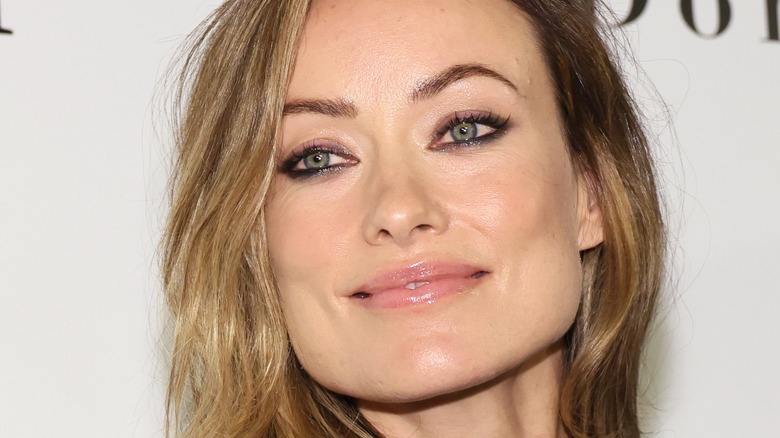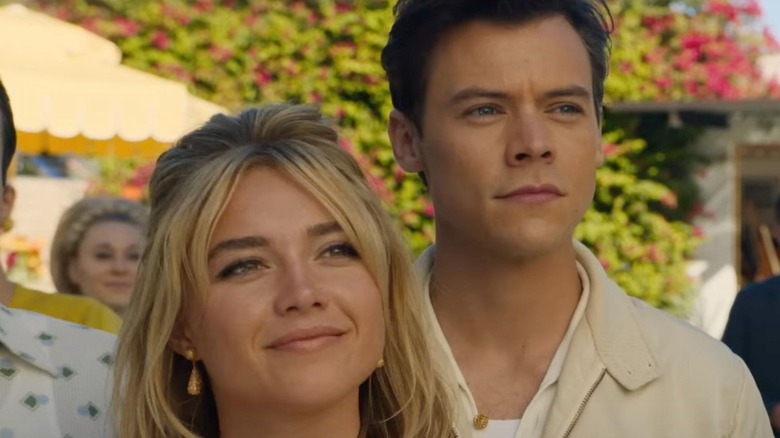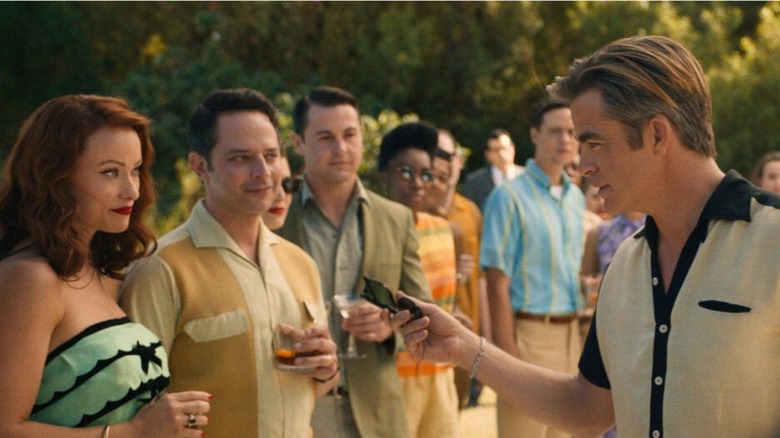Olivia Wilde Looked For One Very Specific Trait When Casting Don't Worry Darling - Exclusive
"Don't Worry Darling," now in theaters, brings chaos directly into the heart of a 1950s-or-so cul-de-sac that's soon under challenge from within its very borders. Florence Pugh plays Alice, a loving but independent housewife who starts to see unsettling cracks in the facade of her supposedly idyllic life in Victory. There are secrets at the heart of their community, and Alice must risk life and limb to get to the truth. It's a gorgeously shot film with strong directorial choices and even more stunning performances (particularly from Pugh, whose talents really anchor the film).
One of the best elements of "Don't Worry Darling" is its charismatic cast. Strong performers like Pugh, Olivia Wilde, and Chris Pine are joined by newer acting talents like Harry Styles, enriching the narrative with their nuanced interactions. As it turns out, the casting process was carefully dictated by Wilde's search for performers who could adapt and land spontaneous character movements and interactions on the fly. In an exclusive interview with "Don't Worry Darling" DP Matty Libatique ("Black Swan," "The Whale"), the seasoned cinematographer detailed how Wilde's casting search was deeply connected to her desire to link the cinematography strategy to these organic performances.
Wilde wanted the freedom to change shots on set
Matty Libatique confirmed that one of Olivia Wilde's directorial attributes is her comfort with "happy accidents," meaning, "She loves the imperfections that became cinematic." While cinema history is replete with detailed perfectionists like Alfred Hitchcock, who frequently and elaborately detailed nearly every shot before cameras rolled, Wilde is much more comfortable with allowing new inspiration to change the shot plan on set. It was so important to the process that Libatique clarified, "Putting ourselves in a position to exploit those things was as important as getting the shots that told the scene in a very basic way."
The result of this preference was a drive to keep the actors as free as the camera. Wilde "loves to move the camera and keep the actors moving," Libatique said. "[We worked] on blocking and shots and timing, and she was on the field with the other actors so she could create timing." With Wilde on set to orchestrate the changes, allowing spontaneity in the camera regularly shifted the blocking plans — and Wilde needed actors who could be flexible and adapt to these shifting elements.
"A good example of that is at the Kaufmann House" at Frank's backyard party, Libatique explained. "The cameras are flowing through this conversation and picking up bits of this conversation and little nuances," he noted, "like Bill being reprimanded by Nick Kroll's character" — while Alice notices the interpersonal nuances.
Improvisational ability was key for the actors
The shifting subtleties of the blocking, timing, and other on-set changes wouldn't work for every performer, so casting for these traits to accommodate the spontaneity was pivotal to the film working. It required "a bunch of actors who can see the camera in their peripheral vision and would time everything out to us," Matty Libatique told us. Nailing down the shots became a collective effort where every performer also became a collaborative set of eyes, giving timing cues and insights to both Olivia Wilde and Libatique.
"[Wilde] cast each and every person because of their ability to bounce off and play this jazz-like orchestra of performance," Libatique explained. The ability to not only actively adapt performance but to cooperatively adjust it on the fly — down to the very timing of each line and movement — became a core skill she searched for in her "Don't Worry Darling" casting strategy, which led to the authentic performances she captured on screen.
"Don't Worry Darling" is now in theaters.


